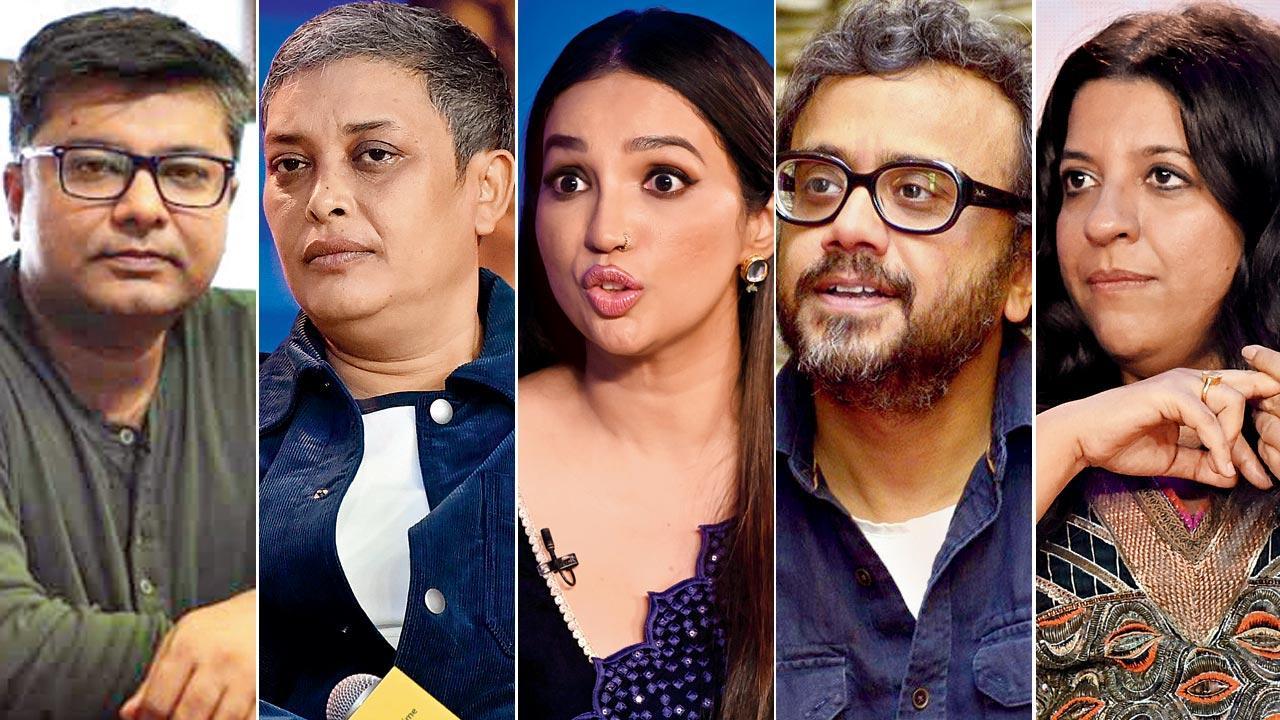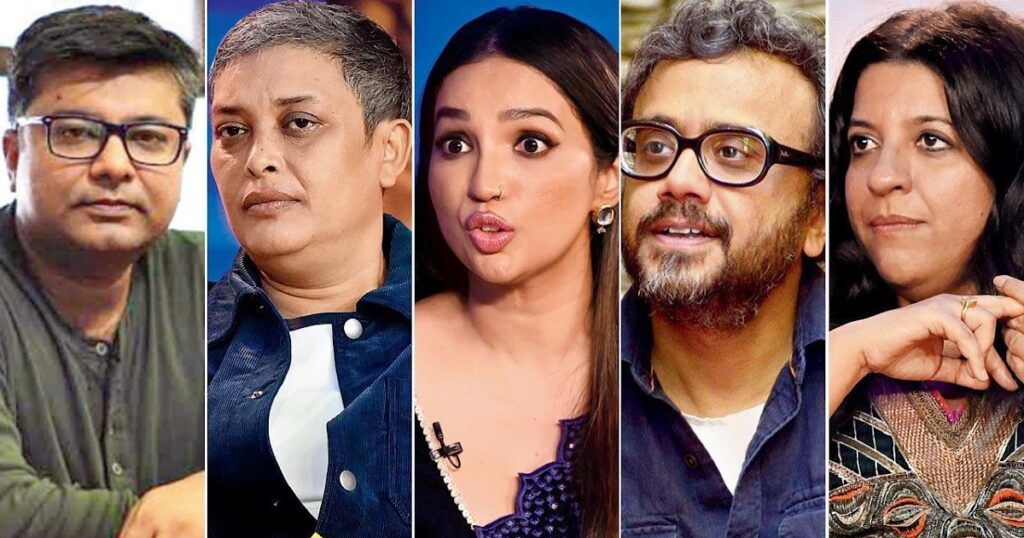
Niren Bhatt; Reema Kagti. Pic/Kirti Surve Parade; Kanika Dhillon. Pic/Satej Shinde; Dibakar Banerjee. Pic/Getty Images; Zoya Akhtar. Pic/Kirti Surve Parade
At the recently concluded 7th edition of the Indian Screenwriters Conference, writers spoke about the industry’s unhealthy practices that are hurting the ones who shape the backbone of the project—the story
Priyanka Sharma (MID-DAY; February 23, 2025)
Never seen before”, “phenomenal”, “relevant”, “hatke” are just some of the adjectives stars often deploy to sell the stories of their next releases during promotions. But one hardly hears the names of the writers, whose work prompt stars to green-light their projects. But the invisibilzation of screenwriters in the Hindi film industry doesn’t begin when a film nears release. It goes back to the beginning of the process, when a writer’s words start taking shape.
As we catch Niren Bhatt at the seventh edition of the Indian Screenwriters Conference held by Screenwriters Association (SWA), the man behind last year’s blockbuster Stree 2, says a brainstorming session between a director and a writer ends up with the former taking the writing credit. “Directors stealing credit is a practice that has been going on for years. The final credit slate will feature them as both director and writer of the project, while the actual writer is given credit somewhere else.”
The fight for rightful credit is exhausting and many a time, a writer is forced to make do with the remuneration and move on. But how is that struggle any better, when more often than not a writer’s pay is dependent on everything else but his/her story. “A writer friend of mine recently showed me his contract with a studio, which I will not name, where it was mentioned that the tranches (of his fee) were dependent on the actor’s approval and once the director comes in, then on his approval. Those kinds of contracts are unhealthy,” shares Bhatt, who also had his share of unfair contracts at the beginning of his career, but success has made negotiations easier. “People need to realize that if you pay writers more, and they deliver, it’s you who makes more money,” he adds.
“Young writers sit with bigger writers or producers and directors, soak in all that these people say, and go home and write. And then, they get the last credit. Just talking a lot doesn’t make you a writer. Only the ones who writes, is a writer. This is one of the biggest challenges that young writers are struggling with today,” says filmmaker-writer Reema Kagti, behind acclaimed works like Talaash, Made In Heaven and Dahaad. She makes her point in her art as well. Her upcoming work, Superboys Of Malegaon, penned by Varun Grover, features an emotionally charged dialogue, which says, “Writer baap hota hai, writer”.
But a mere small talk with any screenwriter in Mumbai will reveal that a writer actually the neglected child of a large family. From stolen credits to abominable fee, Bollywood screenwriters pay a heavy price for every written word. “It’s obnoxious,” says Zoya Akhtar, Kagti’s frequent writing partner and co-producer on Superboys Of Malegaon.
She breaks down why exploitation of writers is casual. “Because everyone thinks they can write. I can’t think I can act or be a cinematographer, as these are very ‘specialized’ skills. With writing, everyone thinks they know end mein kya hona chahiye. They don’t understand a lot of the times what the integrity of the story is.”
Filmmaking doesn’t happen in isolation, it thrives on collaborations, which naturally involve suggestions and inputs from cast and crew members. But that shouldn’t dilute a writer’s role and position, Akhtar says. “Every actor I have worked with isn’t a prop. They are talented beings, who have their process to reach a character, whether we have written it or not. They will come up with their suggestions. As a filmmaker or a writer or a showrunner, it’s your job to filter it, by thinking, is this adding to the larger narrative or the theme I want to sell?”
Screenwriter-producer Kanika Dhillon is reminded of her initial days, when producers and directors would be baffled at her demands. After all, the industry notoriously expects writers to forgo fairness in lieu of work offered to them.
“When I used to go for meetings with producers or directors, their main grouse would be, ‘How are you talking like this? This has never happened here. No writer asks or says this. Hence, you can’t get it’. So, every time I have crossed a milestone, I have made sure to speak about it. So others can do it as well,” she says. Even today, after Dhillon has created a successful filmography that features titles like Manmarziyaan, Kedarnath and Haseen Dillruba (Part 1 and 2), she is asked to not speak up for writers’ rights. “I am told, ‘Arey, you have achieved so much. Why do you need to speak up?’ But why should I not? My success has emboldened me.”
Bhatt believes speaking up is the only option. “Don’t say ‘I am just a writer. No one bothers about me’.” But self-victimization is only natural, when an artiste is constantly pushed to a corner. That’s where community support becomes essential, says National Award-winning filmmaker-writer Dibakar Banerjee.
“A lot of the writers, who work here, are not from Mumbai. They try to write, survive, and face all the existential and creative questions. They are trying to improve their craft. In this kind of a situation, having a community with shared problems, thoughts and ecosystem really works. A community is most important so that nobody is left alone. If you are left alone, you will be exploited. If you are in a community, it’s that much harder to exploit you because we all stand for each other,” he says, lauding the efforts of SWA to uphold a writer’s rights and back him/her in time of need.
“I really hope that this kind of building from strength to strength really reaches that level, where no writer at least who is a part of SWA, feels alone. It’s when you feel alone, you start getting depressed, having doubts about your craft and start listening to idiotic requests from a studio or a platform, who doesn’t understand what you are trying to do. In every which way you become vulnerable. Writers in this city are the most needed and the most neglected at the same time. I have seen the advantages of having a community. That can be anything, your crew, a number of like minded people, who are there. Like, I just got a call from a writer and he had something to say, which was very hard to share. But he shared. That’s what having a community feels like.”

